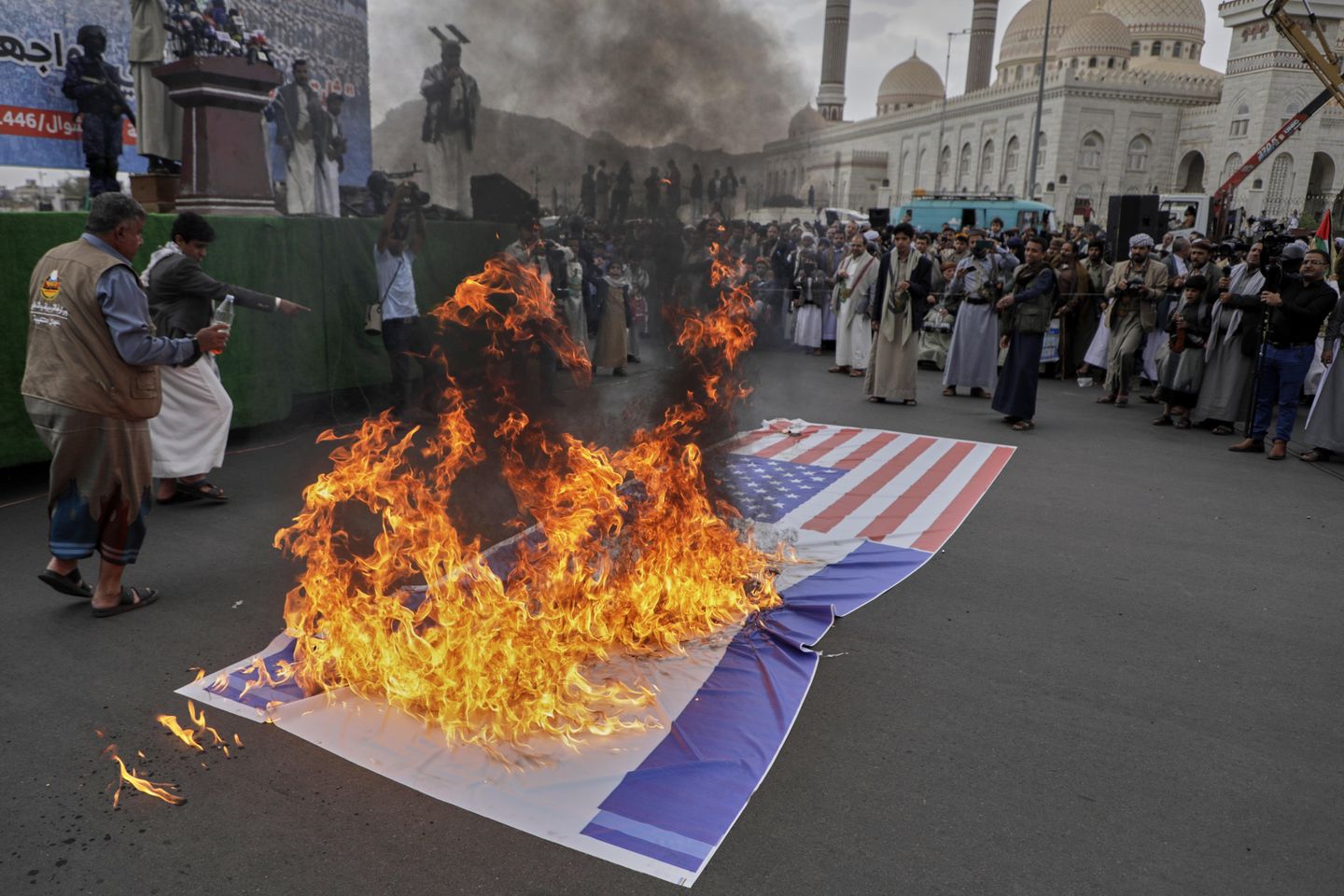
China rejected U.S. government appeals to halt satellite imagery support to Iranian-backed Houthi rebels in Yemen that they are using to target international shipping in the Red Sea, the State Department said.
Spokeswoman Tammy Bruce told reporters that Chang Guang Satellite Technology Co. Ltd. “is directly supporting Iran-backed Houthi terrorist attacks on U.S. interests.”
The support from the satellite company continued despite numerous appeals to Beijing to halt the covert support that U.S. intelligence has directly tied to continuing missile strikes on shipping.
“Their actions and Beijing’s support of the company, even after our private engagements with them, is yet another example of China’s empty claims to support peace,” Ms. Bruce said.
“The fact that they continue to do this is unacceptable,” she said. “We urge our partners to judge the Chinese Communist Party and Chinese companies on their actions, not their empty words.”
In Beijing, Foreign Ministry spokesman Lin Jian said he was not familiar with the Chinese company’s support to the Yemen rebels, but he denied that China is undermining regional peace.
SEE ALSO: China denies supplying weapons to Russia to fight Ukraine
“Since the situation in the Red Sea escalated, China has been playing a positive role to ease tensions,” Mr. Lin said.
He suggested China is promoting peace while the United States is heightening tensions with sanctions and other pressure.
“China urges relevant countries to do what is conducive to regional peace and stability, not otherwise,” he said.
The State Department rejected China’s claim to be acting as an international peacemaker, noting its support for Russia’s war in Ukraine and for North Korea as well as its provision of targeting data to the Iranian-backed Houthis.
“China consistently attempts to frame itself as a global peacemaker,” Ms. Bruce said. “However, it is clear that Beijing and China-based companies provide key economic and technical support to regimes like Russia, North Korea, and Iran and its proxies.”
“The [Chinese Communist Party] continues to enable these regimes, whether it be through the provision of dual-use items Russia needs to sustain its war in Ukraine, North Korea’s ballistic missile development or Iran’s support of terrorism across the Middle East.”
Ms. Bruce said restoring freedom of navigation in the Red Sea is a priority for President Trump. She also warned China to end the support to the Houthis.
“Beijing should take this priority seriously when considering any future support of [Chang Guang Satellite Technology Co.],” she said. “The United States will not tolerate anyone providing support to foreign terrorist organizations, such as the Houthis.”
Mr. Trump has vowed that the terrorist group will be “completely annihilated” and U.S. Central Command has stepped up its attacks on Houthi sites in Yemen since his administration came into office.
Retired Vice Adm. John Miller, former commander of the Navy’s Fifth Fleet, said Chinese communist support to Houthi attacks in the Red Sea is an indication of the new world order China is working hard to create.
“It’s an order that only allows free global trade for Communist China and its proxies,” he said.
“The U.S. and the free world must work hard to reject this malign Chinese vision of the world and ensure safe and free access to the global commons for all nations.”
Mr. Trump and his administration, however, appear to have moderated their public criticism of China despite the ongoing trade war over tariffs.
The president told reporters on Thursday he has a good relationship with Chinese President Xi Jinping and that Beijing had reached out to his administration on trade issues.
“I believe we’re going to have a deal with China,” he said. “And if we don’t, we’re going to have a deal anyway because we’ve set a certain target and that’s going to be it.”
The Pentagon has stepped up attacks on Houthi rebels in recent weeks in a bid to halt the large-scale attacks on shipping in the Red Sea.
The Houthis since October 2023 have attacked more than 60 ships with missiles and drones.
The Red Sea is a major shipping route from the Middle East to China for oil shipments. For international freight companies, the attacks have forced many to route ships to avoid the sea, taking additional time and money.
The diversions are impacting international trade, according to the Defense Intelligence Agency.
When the shipping attacks began in what the rebels say is support for Hamas, another Iran-backed terrorist group, in its war with Israel, the United States initially sought Chinese help in organizing an international coalition to protect shipping and counter the attacks.
China, however, refused and instead sought to reach an arrangement with the Houthis that would end their attacks on Chinese ships, according to U.S. officials familiar with the effort.
That arrangement did not last after a Chinese vessel was struck last year.
However, providing satellite data that is being used to identify U.S. and other ships in the Red Sea for missile strikes appears to be part of a deal between Beijing and the Houthis that would end attacks on Chinese shipping.
On Thursday, a major fuel port used by the Houthis to sell oil in support of their operations was attacked by U.S. forces, the U.S. Central Command said Thursday.
“The Iran-backed Houthis use fuel to sustain their military operations, as a weapon of control, and to benefit economically from embezzling the profits from the import,” the command said in announcing the attacks.
“Today, U.S. forces took action to eliminate this source of fuel for the Iran-backed Houthi terrorists and deprive them of illegal revenue that has funded Houthi efforts to terrorize the entire region for over 10 years.”
Houthi sources said dozens of people were killed in the military strikes that the Central Command did not identify in detail.
The administration on Thursday also imposed sanctions on the International Bank of Yemen, with the Treasury Department saying that they are aimed at halting Houthi attacks on commercial shipping in the Red Sea
“Financial institutions like [International Bank of Yemen] are critical to the Houthis’ efforts to access the international financial system and threaten both the region and international commerce,” Deputy Treasury Secretary Michael Faulkender said in a statement.
The World Food Program halted food shipments to Houthi-controlled areas of Yemen and suspended food distribution there after rebels looted a warehouse used to share food, The Associated Press reported from Cairo Thursday.
Food program Deputy Executive Director Carl Skau said the rebels stole about $1.6 million in supplies from a northern warehouse in mid-March.
The aid suspension is a further blow in the war-torn country where hunger has been growing.
A Defense Intelligence Agency report from February 2024 said Iran’s Islamic Revolutionary Guard Corps-Qods Force since 2014 had provided the Houthis with a growing arsenal of sophisticated weapons and training, being used to attack commercial shipping in the Red Sea and civilian port and energy infrastructure across the region.
The intelligence was based on U.S. and allied interception of some 18 Iranian smuggling vessels to Yemen that seized ballistic missile components, UAVs, antitank guided missiles, and thousands of assault rifles, rocket components, and other illicit weapons on their way to the Houthis between 2015 and 2023.


![NYC Tourist Helicopter Falls into Hudson River, Siemens Executive and Family Among Those Killed [WATCH]](https://www.right2024.com/wp-content/uploads/2025/04/NYC-Tourist-Helicopter-Falls-into-Hudson-River-Siemens-Executive-and-350x250.jpg)






![Green Day’s Cringe Trump Diss Ends in Fire and Evacuation [WATCH]](https://www.right2024.com/wp-content/uploads/2025/04/Green-Days-Cringe-Trump-Diss-Ends-in-Fire-and-Evacuation-350x250.jpg)
![Red Sox Fan Makes the ‘Catch of the Day’ with Unconventional ‘Glove’ [WATCH]](https://www.right2024.com/wp-content/uploads/2025/04/Red-Sox-Fan-Makes-the-‘Catch-of-the-Day-with-350x250.jpg)






